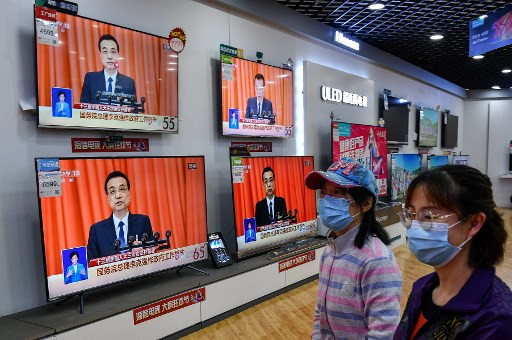Popular Reads
Top Results
Can't find what you're looking for?
View all search resultsPopular Reads
Top Results
Can't find what you're looking for?
View all search resultsChina congress targets HK unrest, premier warns of economic peril
Change text size
Gift Premium Articles
to Anyone
 People walk past televisions broadcasting live coverage from Beijing of Chinese Premier Li Keqiang delivering his speech during the opening session of the National People's Congress (NPC), at a shopping mall in Yantai in China's eastern Shandong province on May 22, 2020. China moved to impose stringent new security laws on restive Hong Kong as its coronavirus-delayed parliamentary session opened on May 22 with a warning from Premier Li Keqiang of the 'immense' challenges facing the world's second-largest economy. (STR/AFP/-)
People walk past televisions broadcasting live coverage from Beijing of Chinese Premier Li Keqiang delivering his speech during the opening session of the National People's Congress (NPC), at a shopping mall in Yantai in China's eastern Shandong province on May 22, 2020. China moved to impose stringent new security laws on restive Hong Kong as its coronavirus-delayed parliamentary session opened on May 22 with a warning from Premier Li Keqiang of the 'immense' challenges facing the world's second-largest economy. (STR/AFP/-)
C
hina moved to impose a controversial security law on Hong Kong at the opening of its annual parliamentary session on Friday, with Premier Li Keqiang also warning of the "immense" economic challenges caused by the coronavirus.
Li's opening speech to the 3,000-member National People's Congress (NPC) is China's version of the US president's "state of the union" address, and he went straight into the threat posed by the pandemic that emerged on Chinese soil.
"At present, the epidemic has not yet come to an end, while the tasks we face in promoting development are immense," Li told mask-wearing delegates in Beijing's cavernous Great Hall of the People, while also touting China's success in suppressing the contagion.
Citing "great uncertainty" ahead, Li took the rare move of refraining from announcing a 2020 growth target for China's coronavirus-battered economy, offering only a vague promise to address mounting joblessness and improve living standards.
Hong Kong under siege
The most controversial move at this year's NPC is a measure that would impose security legislation in Hong Kong -- immediately denounced by the US and pro-democracy figures in the financial hub who called it a death sentence for the territory's unique freedoms.
The draft proposal, to be debated by Beijing's top leaders, will "guard against, stop and punish any separatism, subversion of the national regime, terrorist group activities and such behaviors that seriously harm national security".
It would authorize Chinese lawmakers to directly enact long-delayed Hong Kong security legislation itself at a future date, rather than leaving it up to the territory's administration.
China has made clear it wants legislation passed after Hong Kong was rocked by seven months of massive and sometimes violent pro-democracy protests last year.
Wang Chen, deputy chairman of the NPC Standing Committee, told delegates Beijing must "take powerful measures to lawfully prevent, stop and punish" anti-China forces in Hong Kong.
A bid to enact such legislation in 2003 was shelved after half a million people took to the streets in protest.
But the controversial initiative has been put back on the table in recent years as the pro-democracy movement has gained pace.
"This is the end of Hong Kong, this is the end of 'One Country, Two Systems', make no mistake about it," Civic Party lawmaker Dennis Kwok told reporters, referring to China's description of the territory's status.
"One Country, Two Systems" gives Beijing ultimate political sway over Hong Kong but allows the former British colony to retain liberties unseen elsewhere in China.
"Xi Jinping is burning Hong Kong," said Lee Cheuk-yan, Hong Kong's Labor Party leader, referring to the Chinese president.
Stocks tumbled in the city Friday on news of the security law move.
US President Donald Trump promised to respond "very strongly" once details emerge, and US senators introduced legislation to impose sanctions on any entity involved in curbing Hong Kong's autonomy.
Targets could include police who crack down on demonstrators, Chinese officials involving in Hong Kong policy, and banks that conduct transactions with anyone who infringes on its freedoms.
Economic uncertainty
Although numbers have dwindled, China is still recovering from the COVID-19 outbreak that first appeared in central China late last year and spread globally -- sparking accusations Beijing had mishandled its initial response, leading to nearly 330,000 deaths and economic carnage worldwide.
The pandemic has also sent US-China tensions spiraling to new heights, with Trump this week saying Beijing was responsible for "mass worldwide killing".
China's economic growth shrank 6.8 percent in the first quarter because of the virus, its first contraction in decades.
Li had originally been expected to announce a 2020 growth target of around six percent -- but the pandemic has scrambled expectations, leaving millions of Chinese jobless and imperiling countless businesses.
In a statement published after the speech finished, the government announced it would increase its military budget by 6.6 percent in the year.
The budget will be set at 1.268 trillion yuan ($178 billion) for the year -- the second biggest in the world after the US but continuing a trend of slowing increases.
China's rapidly growing and modernizing armed forces are a source of concern in the United States and neighboring Asian countries nervous about Beijing's rise.
The NPC's highly choreographed annual meetings are conducted amid great pomp aimed at underlining Communist Party control, but this the session was delayed more than two months as China struggled with the coronavirus outbreak, and reduced to only a week.
The session began with a minute's silence for the country's coronavirus victims.









